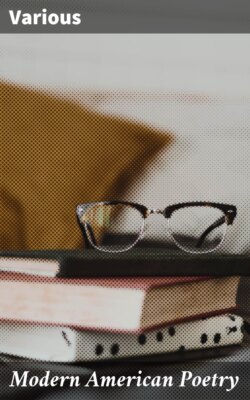Читать книгу Modern American Poetry - Various - Страница 4
На сайте Литреса книга снята с продажи.
THE “POST-MORTEM” PERIOD
ОглавлениеTable of Contents
The nineteenth century, up to its last quarter, had been a period of new vistas and revolts: a period of protest and iconoclasm—the era of Shelley and Byron, the prophets of “liberty, equality and fraternity.” It left no immediate heirs. In England, its successors by default were the lesser Victorians.[1] In America, the intensity and power of men like Emerson and Whittier gave way to the pale romanticism and polite banter of the transition, or, what might even more fittingly be called the “post-mortem” poets. For these interim lyrists were frankly the singers of reaction, reminiscently digging among the bones of a long-dead past. They burrowed and borrowed, half archaeologists, half artisans; impelled not so much by the need of creating poetry as the desire to write it.
From 1866 to 1880 the United States was in a chaotic and frankly materialistic condition; it was full of political scandals, panics, frauds, malfeasance in high places. The moral fiber was flabby; the country was apathetic, corrupt and contented. As in all such periods of national unconcern, the artists turned from life altogether, preoccupying themselves with the by-products of art: with method and technique, with elaborate and artificial conceits, with facile ideas rather than fundamental ideals. Bayard Taylor, Thomas Buchanan Read, Richard Henry Stoddard, Paul Hamilton Hayne, Thomas Bailey Aldrich-all of these authors, in an effort to escape a reality they could not express and did not even wish to understand, fled to a more congenial realm of fantasy. They took the easiest routes to a prim and academic Arcadia, to a cloying and devitalized Orient or a mildly sensuous and treacle-dripping Greece. In short, they followed wherever Keats, Shelley (in his lesser lyrics) and Tennyson seemed to lead them. However, not being explorers themselves, they ventured no further than their predecessors, but remained politely in the rear; repeating dulcetly what they had learned from their greater guides—pronouncing it with little variety but with a vast and sentimental unction. In their desperate preöccupation with lures and legends overseas, they were not, except for the accident of birth, American at all; all of them owed much more to old England than to New England.
